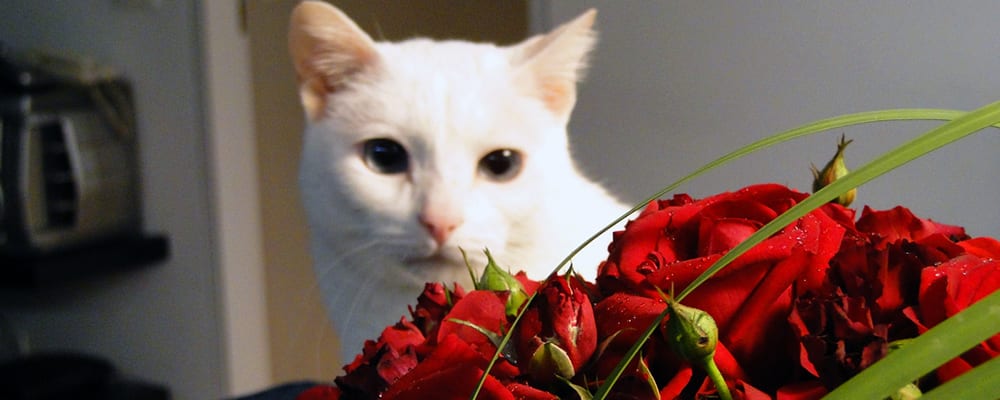Tips for Enjoying a Safe and Happy Valentine’s Day with Your Pet

We hope you get to enjoy quality time with your family members, both two- and four-legged, this Valentine’s Day! Make sure to give your pets lots of love and cuddles, too, and be mindful about their safety. As we all know, chocolate is virtually everywhere this time of year, and it’s hard to resist–even for our pets. Chocolate toxicity in dogs and cats is all too common! Additionally, certain types of flowers and other plants that are often given as gifts on Valentine’s Day can be toxic to our pets. Below, we share some important tips about pet safety, and offer suggestions about making the holiday extra special for your four-legged family members.
Chocolate Toxicity in Dogs and Cats
We can’t say it enough–chocolate is not safe for animal consumption. While some types of chocolate may be less toxic than others, they can still cause illness in pets and possibly lead to a stressful vet visit. White chocolate and milk chocolate tend to be less toxic than dark chocolate, baking chocolate, and cocoa powder. The higher the concentration of cocoa, the more dangerous it is.
Cocoa contains theobromine and caffeine, which when consumed, can cause several different problems in pets, including:
- Vomiting and diarrhea
- Panting
- Restlessness
- Faster heart rate
- Muscle tremors
- Seizures
- Heart failure (in more severe cases)
If you have chocolate in your home, keep it stored up in a cabinet or in a drawer your pet can’t get into. Don’t leave chocolates sitting around where your pet can reach them. If you suspect that your pet has ingested chocolate, contact our emergency hospital right away!
Xylitol Toxicity
Chocolate is probably the most common food danger for pets, but it isn’t the only one. Xylitol is a sweetener that’s often used in many sugar-free candies (including gum) and baked goods. If your pet ingests xylitol, they could be in trouble. While humans can digest and metabolize xylitol without issue, dogs and cats can face potentially deadly consequences if they consume too much. Be extra careful if you have sugar-free treats of any kind in your kitchen (or elsewhere in your home) and check the ingredients in your peanut butter, too–some peanut butter brands use xylitol!
Plant Toxicity in Pets
While it’s safe to assume that our pets will not generally go out of their way to eat flowers and other plants, sometimes their curiosity can get the better of them. That’s why it’s important to be mindful about what kind of flowers you bring into your home, and make sure they’re kept out of your pet’s reach! Some of the most toxic flowers/plants include:
- Lilies
- Tulips
- Azalea/rhododendron
- Amaryllis
- Chrysanthemums
- Daffodils
- Irises
- Peonies
- Carnations
- Baby’s breath
Indulge Responsibly with Pet-Friendly Toys and Treats
If you’re planning to treat your four-legged best friend to some special (pet-only) snacks or a new toy, consider checking with your vet first to find out what products are safest and most suited to your pet. While food allergies are rare in pets, some treats might contain ingredients that upset their stomach or potentially cause serious illness. Furthermore, certain toys can be risky. For example, if your pup is a chewer, toys that quickly break down into easy-to-swallow pieces might not be the best choice. Stringy rope toys can also be harmful if some of the threads get stuck in your pet’s teeth, or if your pet swallows some of the strings, which can damage their intestines.
The Humane Society offers lots of helpful information about picking safer toys for your pet, which you can see here.
 How to Celebrate Valentine’s Day with Your Dog or Cat
How to Celebrate Valentine’s Day with Your Dog or Cat
Most pets aren’t hard to please–they just want to be with you! Still, here are some simple things you can do to make their day extra special:
- Shower them with love and cuddles (if they’re the cuddling type)
- Surprise your pet with a new or favorite treat, or toy
- Take your pup for a drive (if they love car rides) or a nice long walk
- Snuggle up with your pet on the couch for some quality cozy time
- Donate food, bedding, and/or money to an animal shelter or rescue in your area under your pet’s name
- Find a dog or cat treat recipe you can make at home
- Adopt from an animal rescue or shelter
- Visit a friend or family member who could use the company with your pet
However you choose to celebrate the bond you share with your animal companions, be sure to do so with their safety foremost in mind. As always, please contact us at (918) 665-0508 if you have questions or concerns!

 How to Celebrate Valentine’s Day with Your Dog or Cat
How to Celebrate Valentine’s Day with Your Dog or Cat